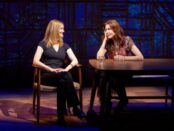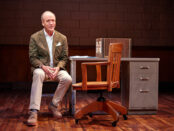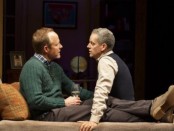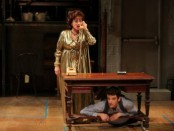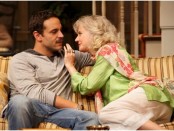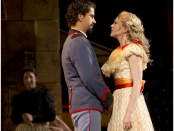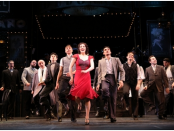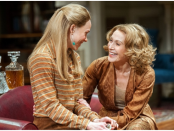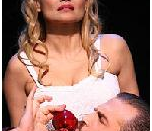John Lee Beatty
John Lee Beatty has a 35-year career in New York theatre. His credits include the long-running revival of Chicago; the Pulitzer Prize winners Doubt, Proof and Rabbit Hole; The Color Purple; The Heiress; The Sisters Rosensweig; and the revival of Edward Albee’s A Delicate Balance. He has 12 Tony Award nominations and has won once, for Talley’s Folly in 1980. Read more in this interview on playbill.com
Must you love your immediate family unconditionally if you know they drive you crazy? And must you show up for family gatherings like Christmas if it always evolves into a vicious fighting match? Is love nothing more than propinquity, that is biological closeness? Leslye Headland’s "Cult of Love" produced by Second Stage at Broadway’s Helen Hayes Theater, a searing comedy-drama, reminds us that most American plays other than Our Town are about dysfunctional families that make various levels of accommodation to their problems. The cast led by Zachary Quinto, Mare Winningham and David Rasche are consummately believable as a family who has seen too many Christmases devolve into shouting matches. [more]
Summer, 1976
Auburn (Pulitzer Prize winner for Proof) has a knack for writing complex female characters. That knack hasn’t failed him in "Summer, 1976." Diane, the lustrous Laura Linney, is an aloof artist/university professor who meets Alice, the warm and magnetic Jessica Hecht, a stay-at-home mom, via their very young daughters. Alice’s husband, the unseen, but occasionally heard, Doug, an economist on the tenure track at the university where Diane also teaches, devised a babysitting co-op that involved coupons exchanged for hours of babysitting, a system that eventually breaks down quite humorously. [more]
On the Town with Chip Deffaa: From Anatevka to Wales
"Fiddler"--brilliantly directed by Joel Grey—is an unusually impactful production. It’s emotionally rich, moving, and timeless. And wholly believable. They had me from the first words of the opening number, “Tradition.” (And what a glorious ensemble sound they got!) Steven Skybell playing “Tevye” won the Lortel Award for Outstanding Lead Actor when this production was first presented in 2019. (And the production as a whole won Drama Desk, New York Drama Critics Circle and Outer Critics Circle awards that same season.) He is an excellent Tevye—earthy, naturalistic, struggling to deal with the hardships of life, and able to leaven the hardships with well-expressed humor. This is a big production for Off-Broadway, with some two dozen actors in the company, and Zalmen Mlotek conducting 10 musicians in the orchestra. I don’t speak Yiddish, but the English supertitles would make it easy for anyone to follow along. I’ve seen Fiddler, in various incarnations, enough times—and I’ve savored the original Broadway cast album since Fiddler first premiered back in the 1960’s—I didn’t really need to read all of the supertitles. I quickly got engrossed in the action. This is one of the greatest of all musicals—the book, music, and lyrics are so strong—it always has rewards to offer. [more]
Everything’s Fine
Actor/writer/director Douglas McGrath is a charming storyteller and his one-man show "Everything’s Fine" is a total delight. He tells the entertaining and poignant story of his eventful 14th year when he was in ninth grade but also describes life in his family of five growing up in Midland, Texas. His tale of darkest adolescence is also nostalgic and reminiscent of the problems of life as a teen. The title turns out to be ironic as it was an expression his father used before announcing there was a new problem. [more]
Bella Bella
Like a great many history plays, Harvey Fierstein's "Bella Bella" is as much about the present as the past, paralleling everything that's gone wrong now with what went wrong then. Unsurprisingly, it's also shamelessly biased, with the first word in the play's title apparently meant to be read in Italian as part of Fierstein's banally straightforward tribute to Bella Abzug, the feistiest of feisty 1970's New York City politicians, best known for her take-no-prisoners liberalism as a member of the U.S. House of Representatives. One's enjoyment of the play probably depends on how prone you are to clap or hiss along with the rest of the unambiguously sympathetic Manhattan Theatre Club audience, even if it's only in your own head. [more]
Long Lost
The play offers no catharsis as the actors are so low-key throughout, all much too calm even when the stakes are rising. As a result, there is little or no tension even when we realize the pattern that each scene will offer a worse revelation than the one before. Tergesen’s black sheep Billy gives us no clue as to the reason for his malignant behavior. Both AuCoin as his brother David and Parisse as David’s wife Molly are cool and sophisticated when they should be losing their temper. Wolff’s Brown University freshman is too inarticulate, but unfortunately he is straitjacketed by the dialogue he has been given. [more]
The Cake
Brunstetter overloads the issue in the play by making Jen have doubts about being in love with a woman against her parents’ religious teachings, even though she cannot imagine life without the caring, compassionate, uninhibited Macy. Additionally, when Della quotes the Bible to Macy, Macy retaliates by pointing out that as a childless woman Della has not fulfilled her religious duty as a wife. The plot then goes in another direction to show us Della and her husband Tim who has lost interest in sex since he discovered he had too low a sperm count. The play builds to Jen revealing her real childhood feelings to Macy, as well as Della demanding that after years of estrangement Tim make passionate love to her as he did at the beginning of their marriage. Ultimately, Brunstetter wants to have it both ways with an ending that does not resolve the religious question at all. [more]
Mother of the Maid
Jane Anderson’s "Mother of the Maid" would probably not be very compelling without Glenn Close’s Isabelle Arc as the play itself is following the dots in filling in the little that is known with mostly common historic and unsurprising details. (One exception is after Isabelle has seen the unicorn tapestries at the palace, she naively asks if there were any of the animals to be seen.) However, with Close who gives a constrained and moving performance the play becomes something else: a persuasive portrait of a mother and wife who has an awakening to the ways of the world based on what happens to her daughter. [more]
Dan Cody’s Yacht
Both Kevin and Cara are single parents, which is only the beginning of the many parallels and contrasts at the heart of "Dan Cody’s Yacht." Though it might come to seem overly formulaic, both the play and the production are good enough to rise above such a criticism. If Cara lives in the middle-income, fictional town of Patchett, and Kevin in the upscale, fictional town of Stillwell--“both towns in the far outer ring of suburbs around Boston,” as we’re told in a program note--she also teaches in Stillwell. [more]
John Lithgow: Stories by Heart
But in John Lithgow: Stories by Heart, Lithgow tells an even more compelling tale about growing up with his father Arthur Lithgow, an actor who taught Shakespeare even as he opened and ran Shakespeare festivals throughout the Midwest. Lithgow’s peripatetic experience with this show is not unlike, in other words, his father’s experiences when his son John was growing up. Though it’s truly sui generis, "Stories by Heart" is reminiscent of Lynn Redgrave’s tribute to her father, Sir Michael. [more]
Junk
The protagonist of "Junk" is one Robert Merkin (Steven Pasquale), whose name alone is reminiscent of the real-life person he represents, Michael Robert Milken, the “Junk Bond King” of the mid 1980’s, who went to jail in 1990, and whose practices led to the world market crash a decade or so ago. “This is a story of kings, or what passes for kings these days,” says Forbes reporter Judy Chen (Teresa Avia Lim), in the play’s opening lines. “….enthroned in sky-high castles and embroiled in battles over, what else? Money.” [more]
Sweat
"Sweat" is a classic, “well-made”--or carefully constructed--play, with a focus on the dwindling work for people in the middle of the country, prompting them to install Trump in the White House--to the ongoing dismay of the rest of the world. It couldn’t be more topical even as it helps us understand just exactly what’s been happening to bring us all to this sorry state. It was also based on Nottage’s extensive interviews with many actual residents of Reading, fueling the drama’s impact. [more]
Sweat
"Sweat," which won the 2016 Susan Smith Blackburn Prize, is reputed inspired by interviews conducted by playwright Nottage and director Kate Whoriskey in Reading, Pennsylvania, named the poorest city in America in 2011. By 2007, Reading had seen its factories and mills closing as NAFTA and globalization made it cheaper to produce goods in Mexico or China, without offering its residents anything but unemployment insurance. The play could probably have taken place in one of a dozen places in the Rust Belt. "Sweat"’s main characters are all eventually affected by this downward trend in a community that has few opportunities. [more]
Takarazuka in “Chicago”
This Japanese version lacks the passion and darkness necessary to make this morality tale pop. The two leading ladies, Wataru Kozuki as Velma and Hikaru Asami as Roxie looked too wide-eyed and innocent to portray such trampy characters, but they moved and sang well. Keaki Mori as Matron “Mama” Morton, in her high, curly wig, totally missed the seamier sexual ambiguity of the character while Chihiro Isono as the put-upon Amos was a tad too low key. Asato Shizuki was slick, but not seamy or sexually provocative as the lawyer, Billy Flynn. [more]
Dada Woof Papa Hot
It was inevitable that legalized gay marriage would lead to plays about gay parenthood. "Dada Woof Papa Hot," Peter Parnell’s sweet-natured, but frustratingly narrow-focused, new play at the Mitzi E. Newhouse Theater explores the kind of child rearing issues formerly supposedly experienced only by straight couples, at least straight couples with large bank accounts. To bring the theme of gay marriage further into the mainstream, divorce also rears its ugly head. [more]
Shows for Days
The production, directed with oddly erratic pacing by the experienced Jerry Zaks, stars the imperious Patti LuPone as the acidly ambitious Irene, the doyenne of a theatrical troupe in Reading, Pennsylvania, in the early Seventies. Wide-eyed, always ebullient Michael Urie, as Car, Beane’s stand-in, becomes her acolyte/scene painter/receptionist/new playwright in the process of discovering a world his suburban existence never hinted at. He is the author’s glib stand-in who keeps the audience in the loop with apt descriptions, editorial comments and sexual confessions. [more]
The Heidi Chronicles
The maternal ending was considered problematical in 1988, but seems less of a copout in 2015. In fact, the feminist thrust of the play has also dulled in the ensuing decades, making Ms. Wasserstein’s play far less effective as an instructive tool. " The Heidi Chronicles" has always been weighed down by too much polemic passed off as drama. What keeps this production afloat now is the incredible filigreed and witty lines that so quickly delineate each character’s foibles and feelings. [more]
Disgraced
That such a devastating scramble of lives can happen in as handsome a setting as John Lee Beatty, magic set designer, manages to evoke, heightens the irony of what takes place there. The rest of the superb production is of equal caliber: Jennifer Von Mayrhauser's so right costuming, Kenneth Posner's so apt lighting, Jill BC Cu Boff's sound. But is this who we are? Where do we go from here? You don't want to miss Disgraced. How are you going to know what the title means? [more]
The Country House
"The Country House" is an old-fashioned drawing room comedy about theater and film people inspired by the plays of Anton Chekhov. From Donald Margulies whose track record includes "Time Stands Still," "Brooklyn Boy," "Sight Unseen," "Dinner with Friends" and "Collected Stories," we have come to expect something more emotionally satisfying. Blythe Danner, Daniel Sunjata, David Rasche and cast are good company but do not make a very convincing case for this new play [more]
Love Letters
Under Gregory Mosher's subtle and assured direction, the two performers always seem age appropriate to their characters. While they do nothing to disguise their real ages, it is as though two older people have gotten together to review the letters that they have written to each other over a lifetime. [more]
Much Ado About Nothing
While Jack O'Brien's production of Much Ado About Nothing is in no way definitive, it is tremendous fun. His strength here as a director is that his 20 person ensemble has become a true community, one that lives and loves together, one we can believe gets involved in each other's problems and joys. [more]
Irma La Douce
Alas, by intermission many in the audience were asking each other: this was a Broadway smash? From Encores! we have come to expect Champagne, and this was a dreary vin ordinaire, a bit pale and a bit stale. [more]
The City of Conversation
The City of Conversation is very rewarding theater whatever your political persuasion may be. The use of the social and political climate of the last 30 years is astutely delineated and always part of the fabric of the play, rather than a history lesson. [more]
The Apple Tree
The best moment finds Chenoweth putting a torrid spin on "I've Got What You Want," and yet not quite able to master the cracking of a whip. It's pure silliness. In Passionella …, Chenoweth plays Ella, a lonely sooty chimney sweep, who is magically transformed by her fairy godfather (Kudisch, who also serves as the story' s narrator), into a blonde sex pot of a movie star. She is destined to find true love, however, with a rock singer (James). Chenoweth's talent for breaking through the sound barrier with her high notes is the highlight of this skit. Fans of Chenoweth will be delighted; others will find the triptych trying. [more]


